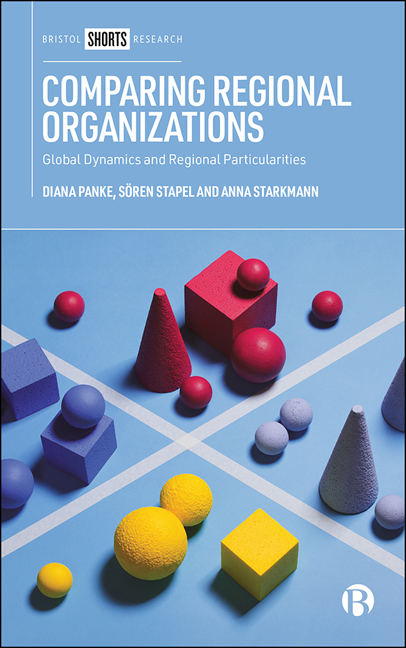Book contents
- Frontmatter
- Contents
- List of Figures and Tables
- Abbreviations
- Preface
- One Introduction
- Two Conceptual Framework and Measurement
- Three The Global Perspective
- Four Regional Organizations in Africa
- Five Regional Organizations in the Americas
- Six Regional Organizations in Asia
- Seven Regional Organizations in Europe
- Eight Conclusion
- Notes
- Appendix
- References
- Index
Three - The Global Perspective
Published online by Cambridge University Press: 12 March 2021
- Frontmatter
- Contents
- List of Figures and Tables
- Abbreviations
- Preface
- One Introduction
- Two Conceptual Framework and Measurement
- Three The Global Perspective
- Four Regional Organizations in Africa
- Five Regional Organizations in the Americas
- Six Regional Organizations in Asia
- Seven Regional Organizations in Europe
- Eight Conclusion
- Notes
- Appendix
- References
- Index
Summary
Comparative regionalism has illustrated that there are ROs in all parts of the globe (Börzel and Risse, 2016a; Söderbaum, 2016b). While there are detailed case studies on some of these organizations, as of yet, a comprehensive analysis of all ROs over a large period of time is lacking.
In order to detect global trajectories of RO development, this chapter sheds light on all 76 ROs at once in focusing on both dimensions that constitute the RO typology: policy scope and size (see Chapter 2). It describes RO creation and membership dynamics as well as the development of RO policy competencies over time (1945– 2015). This reveals first that the number of ROs has steadily increased over time. While there were only two ROs in 1945, states maintain 71 such organizations in 2015, while five ROs were dissolved. Second, regional cooperation takes place in all parts of the globe. There are 23 ROs in Africa, 18 in the Americas, 19 in Asia, and 16 in Europe (see Table A1 in the Appendix). Third, the average size of ROs has risen over time. Fourth, a broadening of RO policy competencies can be witnessed, which is important since such competencies provide the legal ground on which ROs can act on a daily basis. While, for instance, the average RO covered 14.8 specific policy competencies in 1950, this number slowly increased until the end of the Cold War (28.9) and then skyrocketed afterwards (78 in 2010). In short, the proliferation of newly created ROs and their policy competencies took place in two waves of regionalism, one in the aftermath of WWII and one after the end of the Cold War.
The creation and dissolution of Ros
Regional cooperation began in the early 20th century, when the oldest still existing organization, SACU, was created in 1910 by the predecessors of today's Botswana, the Kingdom of Eswatini, Lesotho, Namibia and South Africa (Panke and Stapel, 2018a). It remained the only RO until the AL was founded in 1945, according to the ROCO dataset. In this decade, four additional ROs came into being, thereby starting the first but rather weak wave of regional cooperation. As the dotted line in Figure 3.1 illustrates, the first wave of regional cooperation in which an incremental increase in the cumulative number of ROs can be observed ended with the end of the Cold War in 1990/91.
Information
- Type
- Chapter
- Information
- Comparing Regional OrganizationsGlobal Dynamics and Regional Particularities, pp. 29 - 44Publisher: Bristol University PressPrint publication year: 2020
